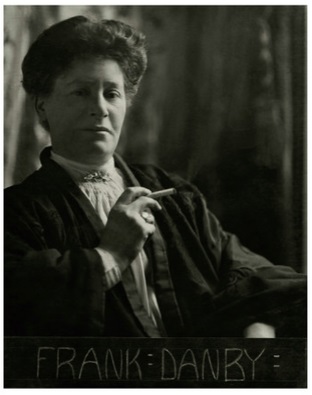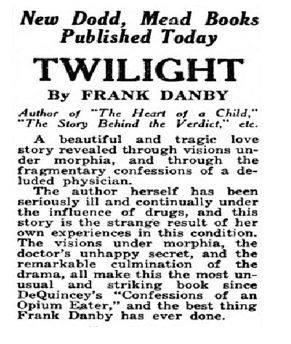Life
1859-1916 [pseud. Frank Danby; var. b. 1864]; b. 30 July 1859, in Dublin; dg. of formerly Jewish artist, Hyman Davis and sis. of James Davis [pseud. “Owen Hall”]; and the actress Eliza Aria; ed. at home [presum. in London] by Mme Paul Lafargue, a dg. of Karl Marx; m. Arthur Frankau, a wholesale cigar merchant (d.1904); issued novels, Dr Phillips, A Maida Vale Idyll (1887) - published in Vizetelly’s one-volume novel series, a story of Jewish life in West-End London - allegedly part-written by George Moore who helped to get it published, and denigrating the philistinism of its denizens vis-a-vis ‘the Deity of Gain’;
she followed this with A Babe in Bohemia (1889) also with Jewish characters and dealing with a Bloomsbury childhood which she compares with the unsanitary conditions of the poor - causing the novel to be blacklisted by Mudie’s circulating library; acquired reputation for Zola-esque realism and did not stint in satirising Wilde and Moore - both characterised as Irish writers; issued Pigs in Clover (1902), a novel of Jewish life in London tracing the conversion of Karl Althaus to Christianity and Englishness; other novels incl. Baccarat [1904] and The Sphinx’s Lawyer (1906) - in which Wilde appears as Algernon Heseltine, and ded. to Owen Hall who repudiated Wilde’s friendship after the trial; in Let the Roof Fall In (1910) in which George Moore is lampooned as the Irish novelist Oscar Patton;
also issued Concert Pitch (q.d.), Full Swing (1914), and We Mothers and Our Children (Nov. 1918) - the last posthumously; her biographical works incl. Life of J. R. Smith (1902) on the 18th-c. artist and engraver, and Lives of James and William Ward (1904); her final novel Twilight (1916), dealing with the effect of morphine, was written between injections of the pain-killing drug; contrib. critical essays to The Saturday Review; she also issued a treatise on color-printing as Eighteenth Century Color-Plates (1900); her sister Mrs Aria acted between Wilde and Henry Irving in relation Wilde’s play The Duchess of Padua; her preface to The Sphinx’s Lawyer takes the form of a ‘revolt from [the] narrow judgment’ of her brother Owen Hall, to whom it is dedicated in repudiating his earlier friendship with Wilde after the fatal trial; d. London, 17 March 1916. IF DIW ODNB SUTH

From Vanity Fair [1900]
| Note: The biographical notes in this entry have been supplemented by information and quotations supplied by Dr. Barry Montgomery (Ulster University) in January 2016. |
|
| Short fiction |
|
| See also |
|
| Miscellaneous (historical) |
|
| Art-history (as Frankau) |
|
|
|
Criticism
Sarah Gracombe, ‘Imperial Englishness in Julia Frankau’s “Book of the Jew”’, in Prooftexts, Vol. 30, No. 2 (Spring 2010), pp. 147-79 [available online; 30.01.2016; login req.]; Lisa Robertson, ‘A Babe in Bohemia’ in London Fictions’ on Facebook [available online; 29.01.2016 — see extract].
[ top ]
| Lisa Robertson, ‘A Babe in Bohemia’ in London Fictions: |
‘A Babe in Bohemia (1889), Frankau’s second novel, was blacklisted by the circulating libraries upon its publication. UnlikeDr Phillips, the novel had not been published by the infamous Vizetelly (who had been prosecuted the previous year for issuing Émile Zola’s work in English and sentenced to a prison term) but the press knew enough to expect ’a further excursion into the drains and dustbins of humanity.’ This is not metaphor alone. A Babe in Bohemia satirises contemporary slum fiction and does so by taking the cause of sanitary reform and its implications of immorality out of London’s East End and placing them in a neighbourhood better known to the press and other literary types: Bloomsbury. |
| Available online; accessed 29.01.2016. |
[ top ]
Quotations
Let the Roof Fall In (1910): ‘Next to Carrie, on the other side to Derry, was the famous Irish novelist, Oscar Paton. He had been red-haired and flamboyant in his youth, with eyes of china-blue, and fat, small hands with which he gesticulated and talked. The red hair had turned white, but the eyes had retained their blue, and the speech its flamboyancy. Oscar Paton was the only literary man in an illiterate age. He told this to everyone, and some of them believed him. Certainly he devoted his entire life to his art, living in Dublin, and only coming over now and again to visit his publishers. With his waving hands he deplored that he was unable to read modern English. He didn’t understand it, he said. He extolled the French novel, and shrugged his shoulders when he regretted our insular lack of literature. Oscar Paton has not a great vogue. The press, the compact little ring that controls the fiction market, always treat him with indifference for even a journalist resents being stigmatized as illiterate’. (Q.p.; Text supplied by Barry Montgomery via Facebook message - 30.01.2016.)
| The Sphinx’s Lawyer (1906) - Dedicatory Preface |
| “OWEN HALL” BECAUSE you ‘hate and loathe’ my book and its subject, I dedicate it to you. For, incidentally, your harsh criticism has intensified my conviction of the righteousness of the cause I plead, and revolt from your narrow judgment has strengthened me against any personal opprobrium that such pleading may bring upon me. I have heard all your argument; I know where I stand. It is at the foot of the Throne of Mercy, with my client by my side, the client of the Sphinx’s Lawyer. You, as well as I, know what he was in his brilliant youth, you, no less than I, know how weak he was in his strength, of what flawed physique and untoward inheritance. Pity was the one unsounded note in the chorus of execration that followed this poor leper to the grave, and beyond it; to awaken pity I have written. For was it not pitiful to see that fine brain set in that unstable body ? What I have written of him whom I have called Algernon Heseltine, I have written in all sincerity, and from deep conviction. I have no serious fear of being misjudged, although you, who have always been so generous in your estimate of my small talent, and appreciative beyond my deserts, now warn me that my hatred of cruelty will be misinterpreted for sympathy with the crime, instead of with the agony, of him who suffered. Algernon Heseltine is the one figure in my book drawn from life. (q.p.) |
| —Text supplied by Barry Montgomery via Facebook message - 30.01.2016. |
References
Dictionary of National Biography: ODNB gives bio-dates 1864, other accounts 1859; dg. lapsed Jewish artist Hyman Davis, ed. at home by Mme. Paul Lafargue, dg. Karl Marx; m. wholesale cigar merchant Arthur Frankau (d. 1904); issued Dr Phillips, A Maida Vale Idyll (1887), allegedly part-written by George Moore and denigrating Anglo-Jewish money-grubbing philistinism; A Babe in Bohemia (1889) is a grim tale of the seduction, infection, an suicide of an epileptic girl whose ‘blood was bad’, banned by Mudie, and disparaged by the chronically cautious Athenaeum; studied engraving, and returned to anti-semitic fiction with Pigs in Clover (1902), on the vulgar comedies of London Jewry; The Sphinx’s Lawyer (1906), her last novel, also anti-semitic.
BL holds 13 vols.
[ There is a biographical entry in Geni.com online, and a notice in the Jewish Encyclopaedia online.]
Irish Book Lover, Vols. 18, 28 - see sundry references.
Booksellers
- John Sutherland, The Longman Companion to Victorian Fiction (Harlow: Longmans 1988); née Davis, pseud ‘Frank Danby’.
- Eggeley Books (Cat. 44) lists Baccarat (London: Heinemann 1904), xii, 236pp.
[ top ]
Notes
Owen Hall: pseudonym of James Davis (1853-1907) an Irish-born 19th and early 20th century theatre writer and theatre critic James Davis when writing for the stage; author of librettos for several very successful musical comedies including Florodora, A Gaiety Girl, The Geisha and A Greek Slave. (See Geni.com - online; accessed 30.01.2016.)
